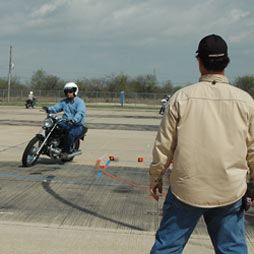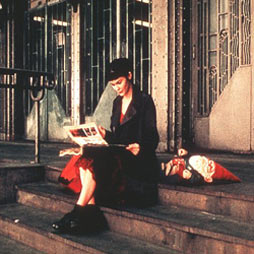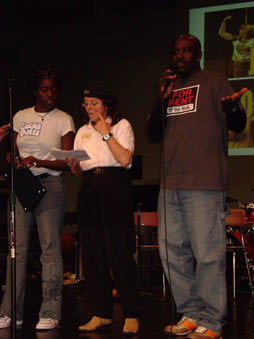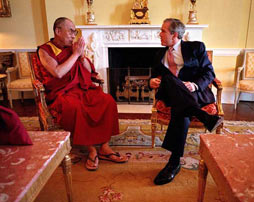By Chris Webb/nw news editor

The white knuckles of my hand clenched fast to the pair of handles before me. It was a chilly day with a heavy overcast. Clouds roamed the sky with threats of a storm hidden in their dark folds.
But with the thumping motor of my Honda Rebel motorcycle beneath me and a mess of orange cones challenging me ahead, I might as well have been on the sun.
After three arduous days of filling my mind with obscure terminology and my muscles with pure adrenaline, I had reached the end.
All that was left to do was pass the driving test and I would have a motorcycle license.
It was a strange feeling: inches from the goal but it felt like miles. I could barely control my breathing.
Every inch of my body began to tingle and sweat poured out of the edges of my helmet as I sat in a single file line of motorcycles awaiting my shot at the figure eight turn. Just as my panic attack was about to reach its zenith, I felt a weight rest on my shoulder.
The sudden touch was enough to make me jump, and almost enough to make me pop the clutch and lose the bike … again. But when I looked left, my panic subsided. The sudden shock had come from one of the two instructors, Frosty Stoll, resting his hand on my shoulder.
“You will be fine Chris. Just take a deep breath and do what you have been doing all weekend, and if you mess up, its no big deal,” he said. “Besides, it’s not like you’re at the DMV.”
After he said that, the ringing in my head stopped, and I took a second look around and realized how right he was.
I was not stuck in a line with a number in one hand symbolizing my entire existence and a piece of paper in the other to give to some over-worked tester who couldn’t care less if I failed. No, I was in the TCC’s Basic Rider Course, surrounded by 10 other people in the exact situation and who had all come to be my friends over the past few days. Best of all, I was learning how to ride a motorcycle!
Everyone of these 10 people came from very different backgrounds, and all had different motivations for taking the course, but none of them had any regrets after that last day.
Some took the course to check off a box on a list of life goals; some did it because their friends were getting into riding, some took it for economical reasons like 78 mpg, and some did it just to see if they could.
Karen Hursly’s motivations stemmed from a mixture of these. She came from a wealthy background and had just recuperated from a serious horse riding injury resulting in nerve damage. During this time, her friends decided to mount something with a little more horsepower and bought Harley Davidsons.
“It seems like yesterday I was in physical therapy learning to walk again, and now I’m learning to ride a motorcycle. I’ve never done anything like this in my entire life,” she said. “I’m just so nervous I don’t even know if I want to do this anymore.”
The first day, this trend continued, Hursly expressing doubt around every turn, concerned that she wasn’t getting it, that she was out of her element.
“I should just go home,” she would say. “I don’t belong here; I can’t do this.”
Nonetheless, every one of her remarks were countered by words of support and encouragement from everyone in the class.
The next morning Hursly came back, and although she didn’t want to, everyone was able to convince her to give it a try. She had a tentative start but it didn’t take her too long to find her comfort zone and realize what we all had come to learn: almost anyone can do this, provided he or she has the desire. Another amazing facet of the class that her trepidation revealed was the unyielding support offered by fellow classmates.
At first, I was concerned that the experienced riders would just get frustrated with those of us who had never even sat on a motorcycle and would just want us to get out of the way. Instead, they offered guidance and advice, the entire class really bonded, and it became a class goal that nobody fail the final test and just have fun. We succeeded on both counts.
Many wonder why someone who already knows how to ride a motorcycle would take the Basic Rider Course. Well, licenses do expire and the old saying about never forgetting a skill—“it’s like learning to ride a bike”—doesn’t necessarily apply when a motor and throttle are involved. Bill Layfield is just one of these people. He served in the Marines for 15 years, during which he rode a motorcycle for seven, and now he is a single father tired of filling up his gas tank every three days.
“Life has just gotten too expensive,” he said. “Besides, I miss riding. Driving to work in the morning can be such a hassle, but not when you have a motorcycle. Trust me, getting up in the morning is a lot easier when you know you get to feel the wind in your face all the way to work.”
Layfield could have just gone to the DMV and taken a riding test, but he said the stress just isn’t worth it.
“I’ve heard about the test at the DMV. You drive around with a police cruiser behind you that honks once for left and twice for right. I don’t want to deal with that. Besides, you have to bring your own bike. I figured why not just take it through the school. It’s relaxed, and it’s actually fun. Besides, you meet some pretty interesting people in the same boat as you, touching up on the basics.
Layfield said some things he didn’t remember are things that could save his life.
All these factors encourage people to take the course, but the most common is the fact that they don’t have to use their own bikes. Not only that, but the instructors provided us with helmets, goggles, and Stoll even lent me his spare riding gloves when I showed up with a bloated pair of snow gloves on.
Also, students are in a controlled environment. If they do fall, there aren’t speeding cars behind them. If students mess up, they will not even have to ask someone what they’re doing wrong. The instructors will promptly point it out and show how to remedy the problem.
The Basic Rider Course is a great way for anyone who has ever considered learning to ride a motorcycle to do so, and without thrashing his or her bike.
Additionally, certified DPS instructors, at a ratio of one instructor to six students, always teach the class. Students just need to make sure they’ve set aside the whole weekend because sleep will be the only thing on the mind when “class” is dismissed.
The course is offered through continuing education on both NW and South campuses. The synonym is MSTX 1040, and the class meets Friday afternoon, Saturday morning (til evening really), and Sunday morning, for a total of 17 hours, six in class and at least 11 riding. After taking the course, the only way to really fail the final test is by dropping a bike during the test.
After learning how to ride, I now know that’s tough to do (although I did manage to pull it off within the first 10 minutes of class on Saturday.)
The course is worth 1.9 CEU credits and the only cache is that even though completers don’t have to take the driving test at the DMV, they will still have to take the written portion, but the class more than prepares students for that as well. Sign-up for the class restarts every week and goes until Thursday. The fee for the course is $180.
“We just want everybody to have a good time and get through the course. We spend the first day in class, but after that, we are riding motorcycles, and that beats the heck out of school any day,” Stoll said.
Registration information
Registering for the Basic Rider Course or the Experienced Rider Course seems to be as difficult for some as actually taking the course.
For students and non-students, one way to apply for the course is to go to the main TCC Web site (www.tccd.edu) and select the Continuing Education tab on the top left side of the home page.
Then scroll down and select Registration Information.
From this page, one can learn how to register online, by mail, by fax or in person at one of the locations listed at the bottom of the page.
An easy way for students to register online is through WebAdvisor.
Once logged in, select “find sections” below the registration tab.
From here, choose the semester you wish to attend below the Continuing Education Terms.
Under “Choose a subject from the list below,” scroll down to MSTX and then add it to “preferred sections” and register. Registration can also be done in person at either the NW Campus or South Campus continuing education offices.
Advanced course offers brush-up for cyclists
For motorcyclists who have been riding for some time but still want to sharpen their skills, the Experienced Rider Course may be just the thing.
This course helps already talented riders improve their riding abilities.
The course is once a month for one day only, on a Saturday morning.
The fee is only $80, and completion of the class will lower one’s motorcycle insurance.
This course has a few other distinct differences from the Basic Rider Course: in the ERC students have to bring their own motorcycles and gear and must have a valid class M license.
The ERC is worth .5 CEUs.





















